|
|
|
Sort Order |
|
|
|
Items / Page
|
|
|
|
|
|
|
| Srl | Item |
| 1 |
ID:
153107
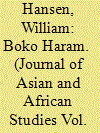

|
|
|
|
|
| Summary/Abstract |
This article is interested in shedding light on why a phenomenon such as Boko Haram came into existence and why it poses a threat to the very existence of the Nigerian state. The Boko Haram phenomenon, I argue, can only be understood as a reaction to more than a half century of corruption, venality, poverty, and abuse by the state predator class. My argument is that Boko Haram is the entirely logical consequence of more than five decades of the post-colonial Nigerian state ruled by a parasitic predator class that is itself a by-product of the colonial state.
|
|
|
|
|
|
|
|
|
|
|
|
|
|
|
|
| 2 |
ID:
131825
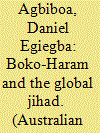

|
|
|
|
|
| Publication |
2014.
|
| Summary/Abstract |
This article critically examines the lethal and growing threat posed by the Nigeria-based Islamist terrorist group Boko Haram or People Committed to the Propagation of the Prophet's Teachings and Jihad. Specifically, the article explores the group's emergence and grievances, as well as its increasing links to the global jihad as spearheaded by al-Qaeda in the Islamic Maghreb and its affiliates like the Somalia-based al-Shabaab. The article then evaluates how the Nigerian state and countries fighting terror abroad, like the USA, have responded to the Boko Haram threat. The conclusion offers some policy prescriptions on how best to respond to Boko Haram.
|
|
|
|
|
|
|
|
|
|
|
|
|
|
|
|
| 3 |
ID:
124487
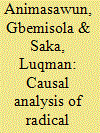

|
|
|
|
|
| Publication |
2013.
|
| Summary/Abstract |
This article attempts an agential explanation of the raison d'être for Jama'atu Ahlis Sunna Lidda'awati wal Jihad, also known as Boko Haram (meaning Western education is forbidden), an Islamist sect that came to public consciousness in 2009 after the extra-judicial killing of its leader. Conceptualising Nigeria as a weak state, the article identifies the failed prebendal relationship between politicians in northern Nigeria and members of Boko Haram, and the extra-judicial killing on 30 July 2009 of Mohammed Yusuf, as agential causations of the current wave of radical Islamism. The article argues for the need to transcend the orthodox interpretation of the current wave of Islamist terrorism being demonstrated by the Nigerian state to a more nuanced approach that pays attention to the essentialist, psychological, political and economic perspectives of Islamist terrorism at the structural and individual levels.
|
|
|
|
|
|
|
|
|
|
|
|
|
|
|
|
| 4 |
ID:
182471
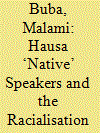

|
|
|
|
|
| Summary/Abstract |
The colonial encounter between the Hausa and the British produced multiple layers of experiences both for the coloniser and the colonised. In addition to its violent history of conquest and domination, it created a ‘text’ of learning through which ideas of ‘mixing truth with falsehood’ were presented, localised and propagated as counterweight to the dominant Muslim epistemology. Mediating and navigating these spaces require deeper understanding and the skilful weaving of divergent epistemologies of the world. In this article, the role of the ‘native speaker’ as a cultural broker is explored.
|
|
|
|
|
|
|
|
|
|
|
|
|
|
|
|
| 5 |
ID:
154513


|
|
|
|
|
| Summary/Abstract |
This article shows how bureaucratic discretion in the implementation of Nigeria's power-sharing institutions, the Federal Character, has led to the formalization of local informal norms on belonging. Under the Federal Character, Nigerians have to be ‘indigenes’ to access certain economic and political opportunities at the federal as well as state and local government levels. However, what makes a person indigenous is not formally defined, leaving street-level officials free to decide how to allocate indigeneship certificates. Using original qualitative and quantitative data on Kano, northern Nigeria's largest city, this article shows that local officials faced with this discretion often turn to locally salient norms on belonging. In Kano, several of these norms set ethnic and religious criteria for belonging, particularly those that prioritize the rights of the ‘native’ over those of the citizen. The article demonstrates how street-level bureaucrats use these ethnic and religious criteria to allocate indigeneship certificates, prioritizing Kano's ‘natives’ over other Nigerian citizens. This dynamic may be mirrored across Nigeria, depending on the norms on belonging that are locally salient. While the article suggests a simple technical solution – formally defining indigeneship on the basis of residence – it also shows the deep political barriers to its implementation.
|
|
|
|
|
|
|
|
|
|
|
|
|
|
|
|
| 6 |
ID:
137754
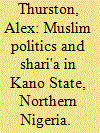

|
|
|
|
|
| Summary/Abstract |
Since 1999, Muslim-majority northern Nigeria has witnessed a new phase of political struggles over the place of Islamic law (shari'a) in public life. This article traces how Muslim politics played into shari'a administration in Kano, northern Nigeria's most populous state, and argues that governmental bureaucracies created for the purpose of administering shari'a became sites of political contests over the meaning of public morality in Islamic terms. Shari'a bureaucracies featured as prizes in unstable political alliances between Muslim scholars and elected Muslim politicians. Politicians' appointments of Muslim scholars to bureaucratic positions, and their empowerment or disempowerment of certain bureaucracies, posed fundamental questions concerning who would control the shari'a project and what its content would be. The manoeuvres surrounding Kano's shari'a bureaucracies reflect broader trends in northern Nigerian politics. The shari'a project has not been a manifestation of Islamism in a narrow sense, but rather the site of a more complex set of intra-Muslim rivalries and electoral competition within an ostensibly secular political system.
|
|
|
|
|
|
|
|
|
|
|
|
|
|
|
|
| 7 |
ID:
096427
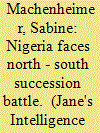

|
|
|
| 8 |
ID:
190441
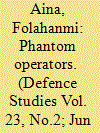

|
|
|
|
|
| Summary/Abstract |
Across the world, Special Operations Forces (SOFs) play a leading role in asymmetric warfare. The unique trainings, skills, weapons, and equipment of these elite Tier 1 operators, differentiates them from conventional forces, making them the preferred choice in complex environments. SOFs are ideally deployed for short operations, which include direct action missions, hostage rescue, hunting high-value targets (HVTs), mobility operations, intelligence operations, airborne operations, counterterrorism (CT), counterinsurgency (COIN) operations, and covert operations among others. While the literature has mostly focused on the utility of major powers’ SOFs in the Global War on Terror (GWOT), with little attention on Africa’s SOF’s, this paper examines the origins, evolution, composition, and deployments of Nigeria’s SOFs specifically in the Northeast, Northcentral, and Northwest theatres of operation, against the Boko Haram insurgency and armed banditry, respectively. Drawing on primary data from interviews with key informants and other secondary data sources, the paper interrogates the successes, challenges, and prospects of Nigeria’s SOFs. The strategic utility and overreliance on Nigeria’s SOFs by political leaders and the Military’s High Command puts a strain on their strategic value which potentially undermines their strategic efficacy as a force-multiplier in the long run, against unconventional threats.
|
|
|
|
|
|
|
|
|
|
|
|
|
|
|
|
| 9 |
ID:
154700
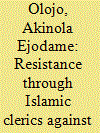

|
|
|
|
|
| Summary/Abstract |
Islamic clerics and scholars constitute one of the community actors affected by the Boko Haram crisis in northern Nigeria. This group is also one that is most familiar with the essential doctrinal elements required to deconstruct the narrative pushed by Boko Haram in a crisis where ideology represents a vital aspect. While not undermining the bearing which socio-economic and political issues have on the crisis, this paper frames the focus to emphasise the long-term battle where Islamic clerics are involved in winning hearts and minds. Drawing upon fieldwork conducted in Sokoto State and Borno State, this paper highlights the influential role of clerics in communal mobilisation and resistance against Boko Haram. It is suggested that a deeper integration of this community actor into the broader counter-insurgency struggle in northern Nigeria would be beneficial.
|
|
|
|
|
|
|
|
|
|
|
|
|
|
|
|
| 10 |
ID:
145469
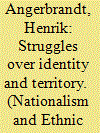

|
|
|
|
|
| Summary/Abstract |
This article explores how ethnoreligious conflict over boundaries and territoriality involves a politics of scale, that is, how positions and demands are framed by actors according to, for instance, local, regional, and national scales. The analysis focuses on how Muslim actors in a conflict in Kaduna State in Nigeria frame a regional, northern Nigerian identity that varies in content and form depending on the scalar context in which communal conflict is placed with regional and national politics yielding different identifications.
|
|
|
|
|
|
|
|
|
|
|
|
|
|
|
|
|
|
|
|
|